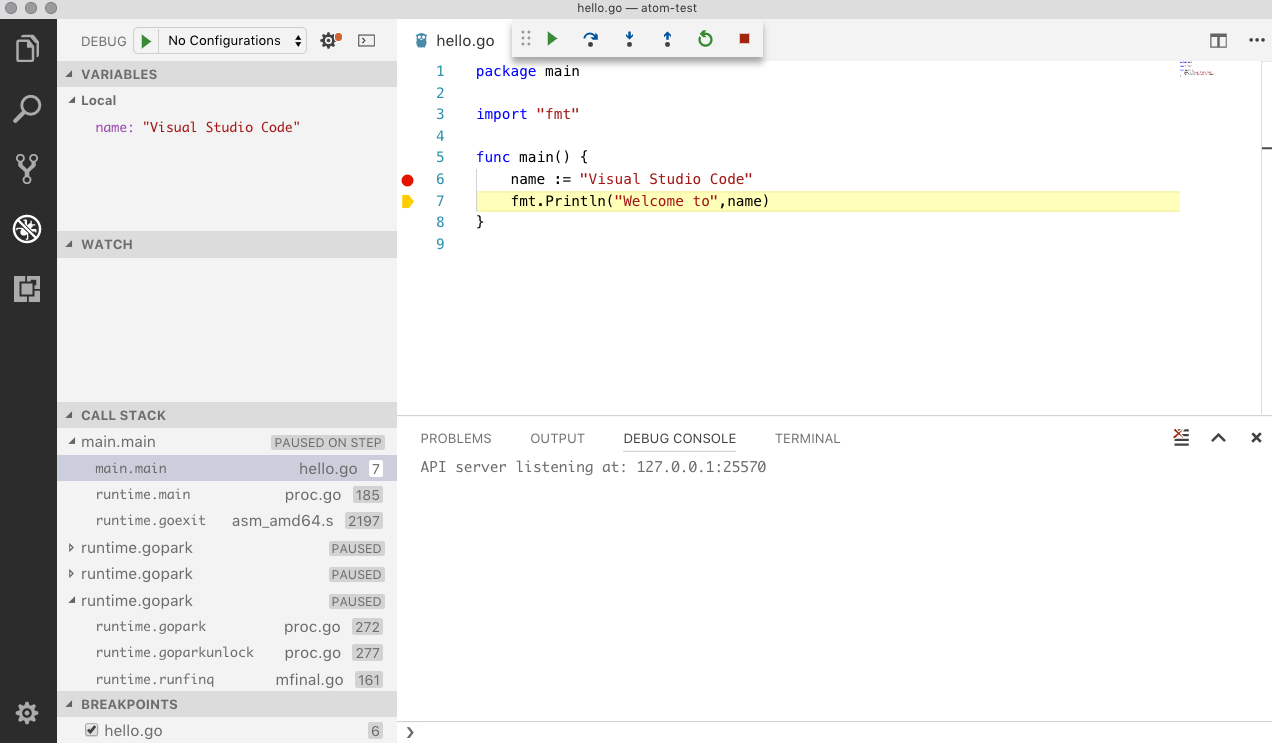Jan 02, 2017 Visual Studio General Questions https. In my opinion, VS is good at C#, C and VB debug and development, but in Golang developing, I suggest you had better use VSC. Like Visual Studio Code and Goland, this code editor checks your Golang syntax while you write code. Over and above its Go-specific functionality, Sublime Text offers other general code editing features that help software developers improve their output efficiency. Coming from Visual Studio LiteIDE feels like home. Conf F7 to build and run the app inside LiteIDE, I don't want random terminals laying around and configuring watchers to see when I save a file as reboot my app. That being said, on my work related VS things, I never run the app inside VS:) It does have bugs and annoyances.
June 9, 2020 by The VS Code Team, @code
From the beginning, we have worked with developer communities to build Visual Studio Code as a powerful, extensible editor. Five years into this journey, individuals and organizations in our community have helped us create an editor that is really for all developers, using any language.
For many of our 11 million users, VS Code is their primary code editor, as is the case for 41% of developers that are working with Go (according to the Go developer survey). We are proud of the work that we have done on the Go extension for Visual Studio Code, which is the result of an extensive development effort together with the Go community by virtue of both code contributions and integration with over a dozen independently maintained tools.
Last year, we worked with the Go team to enable support for a new language server for the Go language, gopls, and improving support for the Delve debugger. Using the new language server improves the experience of Go developers working with VS Code. It offers an integrated solution for various components of the core developer experience (code completion, jump to definition, hover tooltips, etc.) through a tool that is maintained by the Go project itself and is kept up to date with support for new language features such as Go modules.
The Go extension for VS Code joins the Go project
Today we are happy to announce that the Go team has officially stepped up as the new maintainer of the Go extension. During the last few years working together with the Go team, it's been clear they are in the best position to advance the tooling ecosystem for Go and ensure that it evolves alongside the language.
Both the Go and Visual Studio Code teams recognize the importance of Visual Studio Code to the Go community and believe strongly in an open tooling ecosystem for Go developers. Even as the extension graduates to be part of the Go project, the VS Code team will continue to work together with the rest of the Go project and the community to deliver a great experience for all Gophers.
Being part of the Go project will also ensure that the community is engaged on every step along the way. The extension currently depends on many different tools that are maintained by the community, and we want to work with the owners of those projects to help reduce the burden of maintenance work on the Go community.
In practical terms, as the extension graduates to being part of the Go project, we will be changing the publisher of the extension from 'Microsoft' to 'Go Team at Google' in the VS Code Marketplace.
Additionally, the source code repository for the extension is changing to join the rest of the Go project at golang/vscode-go.
Amongst our community of contributors, we'd like to extend special thanks to Ramya Rao (@ramyanexus), the lead maintainer of the extension and contributor to the community for many years, as well as Luke Hoban (@lukehoban) and Erich Gamma (@erichgamma) for their contributions since September 2015! We would also like to thank Rebecca Stambler (@stamblerre) and the Go team for their collaboration.
Contributing and support
In order to offer the best experience to Go developers, we ask you to continue sharing your feedback with us by opening issues on GitHub. We also welcome every contribution from the community.
Visual Studio Golang Launch.json
If you need assistance with the Go extension for VS Code, you can connect with our team members on the #vscode channel on the Gophers Slack. Conversations between Go team members working on the extension will take place in the #vscode-dev channel in the same Slack workspace, and we welcome discussion on issues and contributions from all community members.
From all of us in the Visual Studio Code and Go teams, we are excited for the future ahead and for the ability to work together to deliver world-class tooling to every developer working with Go, and we look forward continue collaborating with the community.

Happy Coding!


The VS Code Team
P.S. You can also read the announcement from the Go team on The Go Blog.
Today we are announcing the release of Visual Studio for Mac version 7.6. Our focus with this release has been to improve product reliability in various areas, with a special focus on the code editing experience. We have also made several fixes that improve IDE performance. Finally, we’ve extended our support for Azure functions with the addition of new templates and the ability to publish your function to Azure from within the IDE.

- Click the button to download the latest version of Visual Studio 2017 for Mac. For instructions on setup and install, see the Setup and Install Visual Studio for Mac documentation. To learn more about Visual Studio 2017 for Mac, see Mac System Requirements and Mac Platform Targeting.
- Go in Visual Studio Code. Using the Go extension for Visual Studio Code, you get language features like IntelliSense, code navigation, symbol search, bracket matching, snippets and many more that will help you in Golang development.
- Persistent performance and reliability issues in the Visual Studio for Mac IDE will be addressed by replacing most of the editor internals with code from the Visual Studio Code editor. That news comes in a blog post today (Oct. 16) announcing Visual Studio for Mac 2019 and a new roadmap.
This post highlights the major improvements in this release. To see the complete list of changes, check out the Visual Studio for Mac version 7.6 Release Notes. You can get started by downloading the new release or updating your existing install to the latest build available in the Stable channel.
How to use Delve debugger in Visual Studio Code. Ask Question. Up vote 11 down vote favorite. For using Delve debugger in Visual Studio Code with Golang, do the following steps. Check out this bug of vscode-go, it is affecting both MAC OS and Linux, as of October.
Improving reliability of the Code Editor
We’ve focused our attention on improving the reliability of the code editor in Visual Studio for Mac and have addressed several issues with the code editor. In particular, we want to highlight the following fixes to issues many of you have reported:
- We fixed an issue where Quick Fix menu items don’t display if source analysis is disabled.
- We also addressed a widely reported issue where tooltips wouldn’t disappear.
- We fixed an issue where IntelliSense seems to fail, resulting in red “squiggles” continuing to hang around in the editor even though there were no errors.
- We improved IntelliSense for F# developers. There was an issue where you could not use “.” for autocompletion, but we’ve fixed this and various other F# IntelliSense issues.
- We made improvements to JavaScript syntax highlighting.
Improving performance of the IDE
One of the top reported bugs in previous releases has been performance issues in the editor. Having a fast and reliable code editor is a fundamental part of any IDE and an important part of any developer’s workflow, so we’ve made some improvements in this area:
- We improved tag-based classification for C# with PR #4740 by reusing existing Visual Studio for Windows code, which should improve typing performance in the editor.
- We now support no-op restore of NuGet packages when opening a solution. This change speeds up NuGet restores on solution load.
We’ve also added many more small fixes that improve startup time and reduce memory consumption of the IDE.
Richer support for Azure Functions
Azure functions are a great way to quickly get up and running with a serverless function in just a few minutes. With this release, we have introduced new templates for you to choose from when creating your Azure Functions project:
These new templates allow you to configure access rights, connection strings, and any other binding properties that are required to configure the function. For information on selecting a template, refer to the Available function templates guide.
Another major part of the Azure functions workflow that we are introducing with this release is publishing of functions from Visual Studio for Mac to the Azure Portal. To publish a function, simply right-click on the project name and select Publish > Publish to Azure. You’ll then be able to publish to an existing Azure App Service or use the publishing wizard to create a new one:
For information on publishing to Azure from Visual Studio for Mac, see the Publishing to Azure guide.
Visual Studio 2019 Golang
Share your Feedback
Visual Studio Golang Support
Addressing reliability and performance issues in Visual Studio for Mac remains our top priority. Your feedback is extremely important to us and helps us prioritize the issues that are most impacting your workflow. There are several ways that you can reach out to us:
Visual Studio 2017 Golang Support
Visual Studio Golang Windows
- Use the Report a Problem tool in Visual Studio for Mac.
- We are enhancing the Report a Problem experience by allowing you to report a problem without leaving the IDE. You’ll have the ability to automatically include additional information, such as crash logs, that will help our Engineering team narrow down the root cause of your report more effectively. This will be introduced in an upcoming servicing release to 7.6 that will be available in the Stable channel within the next few weeks.
- You can track your issues on the Visual Studio Developer Community portal where you can ask questions and find answers.
- In addition to filing issues, you can also add your vote or comment on existing issues. This helps us assess the impact of the issue.